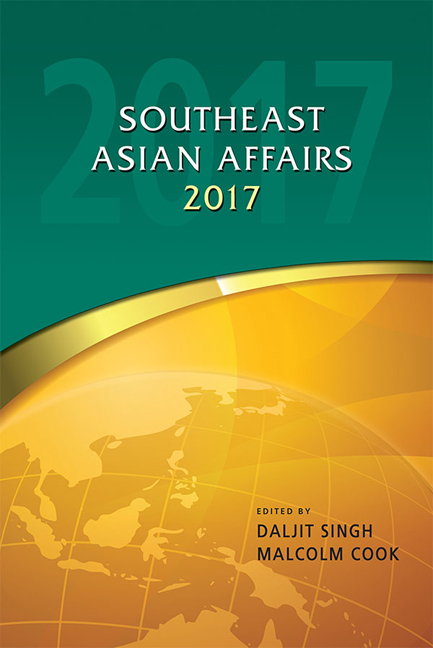Book contents
Uncertainty in Duterte's Muslim Mindanao
from THE PHILIPPINES
Published online by Cambridge University Press: 12 January 2018
Summary
President Rodrigo Duterte's ascent to Malacañang has been hailed as the best chance to resolve the challenges of secessionism and terrorism in Mindanao. Hailing from Davao City, Duterte has emphasized his Mindanao roots. Coupled with the curated image of an everyman, the new Philippine President has promised a definitive end to the Mindanao conflict. Lofty promises aside, it would appear that Duterte has yet to craft a coherent and consistent policy to steer Mindanao out of conflict.
Instead, contradicting policies reflecting volatility and continuity appear to be the Duterte model for peace. For extremist groups such as the Abu Sayyaf Group (ASG) and the Maute Group, Duterte appears to take a hard-line combat and intelligence-driven approach — for now. However, volatility has also characterized Duterte's stance against these fringe extremist groups, from casting them as “desperate” poverty-stricken individuals to criminals “slaughtering people as if they were chickens”. In contrast, continuity appears to be the direction his administration has taken as it deals with the Moro Islamic Liberation Front (MILF), as seen in the reconstitution of the Bangsamoro Transition Commission (BTC).
It is uncertain whether Duterte's ambivalent policy towards Mindanao peace will suffice to address the complexity of conflict in the southern Philippines. Duterte can ill afford missteps, considering the growing salience of external factors that impinge on Mindanao; namely, the spectre of violence inspired by the Islamic State of Iraq and Syria (ISIS) and the outcome of peace negotiations with the National Democratic Front (NDF). A cohesive policy to address the socio-economic roots of conflict would be more effective than gallivanting from continuity to volatility and back.
The Current State of Play in Mindanao
On 26 November 2016 the Maute Group occupied the abandoned portions of Butig municipality in Lanao del Sur province. Nearly ninety per cent of the town's population were displaced, as another round of clearing operations by the Philippine Army (PA) was under way. After a five-day campaign the military declared that eighty per cent of Butig had been retaken, with the Maute Group on the run. Just a few months ago, in June 2016, the military declared that the final Maute stronghold, Camp Darul Imam, had been captured and the group defeated — the supposed culmination of months of sporadic skirmishes in Lanao del Sur that began in February
- Type
- Chapter
- Information
- Southeast Asian Affairs 2017 , pp. 297 - 312Publisher: ISEAS–Yusof Ishak InstitutePrint publication year: 2017

